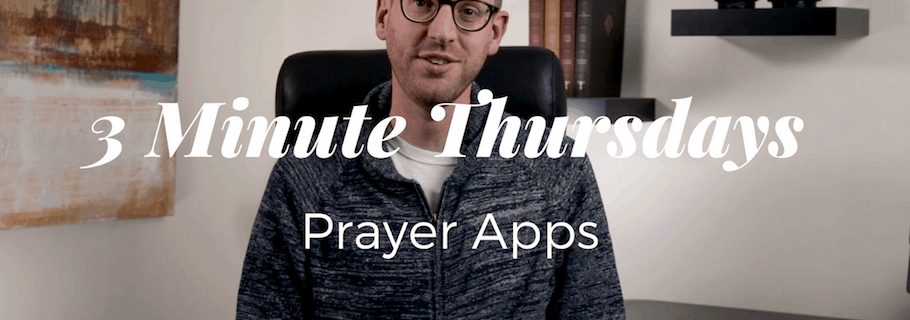Welcome to another edition of 3 Minute Thursdays. I’m Tim Challies and here is my challenge over the next three minutes; to say something useful, hopefully, helpful about a subject that’s of interest to people like you. Today I want to talk about prayer. Specifically, I want to talk about why I pray every day using an app.
Transcript
Welcome to another edition of 3 Minute Thursdays. I’m Tim Challies and here is my challenge over the next three minutes; to say something useful, hopefully, helpful about a subject that’s of interest to people like you. Today I want to talk about prayer. Specifically, I want to talk about why I pray every day using an app. So, we’ll role the intro and then we’ll get to it.
Today we’re talking about prayer, and why I pray every day using an app. So, we’ll get that three minutes on the clock, and we will get to it.
I’m one of those routine people. I admit it. I like to get up every day and follow roughly the same pattern. So, I come downstairs, grab my cup of coffee, and I head to the living room to do my devotions using an iPad and a phone. I’ve talked before about how I use my iPad to read the Bible. I use my phone to pray. Let me tell you how and why I do that.
A few years ago a book in the UK came out with an app called PrayerMate. This was an app designed to help people like me pray, and I found it very, very helpful. Now, when a new app or a new program comes along, what you usually find is it takes a real world paradigm and it just updates it. It digitizes it. And that’s what he did here. The paradigm he follows is essentially the prayer method that uses index cards. So, imagine that you’ve got an index card box. Within it, you open it up and you see that there’s dividers running along. And then behind each of the dividers, a series of index cards. Okay, so the box is the app, it’s the prayers, the sum total of the prayers. Each of the dividers is a different kind of prayer. A different category of prayer. And then each of the index cards is an actual prayer. You might have a name written on it with a scripture text below to pray for that person, or for that thing. That’s the paradigm he uses. I find that’s a very, very helpful way to pray. I’ve actually used it in that older paradigm. I love that there’s an app that does this.
So here’s how it works. Every morning, I grab my phone. I simply open it up. And what do I find? I find PrayerMate app there. I tap on the app, and that’s all it takes. I’m simply swiping left to pray. First time I swipe, it shows me the Gospel. It shows me some scripture passage related to the Gospel. I simply pray that to the Lord. I swipe again and I find some prayers of confession. Things to confess to the Lord. Swipe again and I’m praying prayers of thanksgiving. As I keep swiping, then I move into different categories of prayer. So I’m praying now for my family. I’m praying for my own character. I’m praying for the elder qualifications, first for myself, and then for my fellow elders at the church. All these different categories of prayer and each card has a prayer on it, has a scripture text to help develop my prayer, to help, make sure that I’m praying in a way that’s honoring to the Lord. What better thing can we do than pray God’s Words to God? And so this app has made a big, big difference in my life, in some very, very helpful ways.
First, it’s helped me pray more. It’s given me the structure to make sure every day I’m praying to the Lord. So I’m not praying the same old prayers but it’s mixing them up, it’s making sure that I’m praying something a little bit different every day. So I have five or ten different prayers. I pray for my kids, one of them each day. It’s also making sure I’m praying for all the things I ought to pray about. There’s so many things I should pray about. And I like to pray in the concentric circle model. I pray, first for myself, then for my family, then for my church, then for my neighbors, then for the world. And this app is very well geared to do that.
Put it all together. A very, very helpful app. I commend it to you. And I ask you to check it out in the app store related to your device. See if it’s a good way for you to pray as well. And I’ll see you again in another 3 Minute Thursday.










